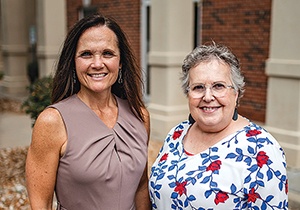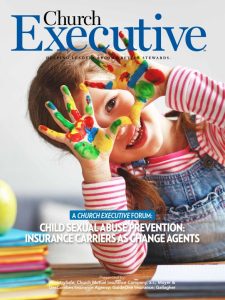
Steps to take before — and, God forbid, after — an allegation is made
Insurance carriers — by instituting requirements and guidelines for acquiring coverage — have done a great job of bringing about change and moving church clients toward having a child protection policy in place.
Indeed, with respect to our own church clients, we find that most now understand the importance of having a child sexual abuse prevention plan in place. For those that don’t know where to start, we consider it a privilege to assist them.
On the other hand, we see many churches making mistakes after an allegation is made.

Agents/Church Specialists
Moyer & DesCombes Insurance Agency
To respond properly, some steps must be taken before an allegation occurs.
Ministries must understand the importance of taking a victim-centric, not ministry-centric, approach. A victim-centric framework bases decisions and actions on the well-being of the victim regardless of the impact on reputation or public perception for the church. A victim-centric orientation is not only necessary but also morally right, biblically sound, and positively impacts public perception.
As believers, we tend to want to be peacemakers, to assume the best of people. We can be reluctant to believe that someone whom we know, and love, could do something inappropriate — especially in the house of the Lord.
We must fight the tendency to assume it’s just an allegation or accusation as well as any inclination to handle the situation ourselves. We must resist the urge to protect the church and its reputation over the need to minister to the wounded.
In trying to protect the church, many leaders try to investigate the claims internally. This is always a mistake; you must report to the appropriate agencies immediately and fully cooperate with them.

Lack of transparency and proper response ultimately can destroy the ministry. Although church leaders’ efforts to protect the church in the aftermath of an allegation might be well-meaning, the victim is left unsupported and often re-victimized. Without transparency and a proper response, ministry leaders are portrayed as callous, defensive and self-serving in their actions. People want to be treated with dignity and care. Victims want (and need) to be believed!
It’s easy for churches to have the mindset that they are a fellowship of like-minded believers, a group of God-loving people who are like family and know each other very well. That’s the biblical culture. However, this same mindset can make churches more vulnerable targets for sexual abuse.
It’s imperative that churches follow their own guidelines for those who can work with children. Church leaders must be constantly on the lookout for the well-being of their children and fulfill their responsibility as mandatory reporters. The well-being and protection of the children in a church’s care must trump any “feeling” or “comfort” within the body of believers. The rationalization of it could never happen here is neither rational nor acceptable.
Those preying on children rely on and expect this to be the mindset of churches, making them an “easy target” in a perpetrator’s mind. When churches have a different mindset, perpetrators see something different: a church acting as the sheepdog for its flock. It’s a mindset which protects those entrusted in the church’s care to the fullest degree, an approach that’s child-centric.
As agents who work with churches and Christian ministries, we have a front row seat to the wonderful, miraculous work of the Lord. Sadly, however, we also have a front-and-center perspective when churches face heartbreaking situations. We feel passionately about risk management and work with our church clients to help them obtain resources, lead risk management seminars, and participate in conferences where those who serve the Lord can receive risk management tools for protecting their ministries.
Additionally, to obtain sexual misconduct liability coverage, most insurance carriers now require certain elements be part of a church’s child protection program. If these requirements aren’t met, coverage is often withheld. These include background checks, reference checks, a Known Sex Offender Policy, an at-least-two-adult-workers rule in every classroom and at each event, a minimum-attendance-time requirement, mandatory training, and a response plan.
Moreover, ongoing training is a critical component for a church to safeguard those entrusted to their care.
It’s critical that churches have in place — and follow — a child protection policy. In fact, having a policy that your church doesn’t always follow, or ignores entirely, can be even more detrimental than having no policy at all.
To this end, as insurers, we continually work with church clients to ensure their child protection policies are truly implementable. When church leaders assign guidelines which they know their churches can’t possibly adhere to, it accomplishes nothing for the ministry and fails to create a safe environment for the children in their care.
Churches must be committed to reviewing their child protection policy with all those who serve minors and vulnerable adults. This should be done regularly to ensure understanding of the policies in place and consistent adherence.
It’s always heartbreaking when someone has been abused. We encourage church leaders to avoid compounding tragedy and trauma by doing all they can to minimize the risk of abuse occurring, and by responding appropriately when they become aware of or observe concerning behavior.
We should be compelled by the Gospel to set the standard of care well beyond the minimum expectations.
Becky Moyer and her husband, B.J. Moyer, founded Moyer & Moyer Insurance Agency [ www.moyerinsuranceagency.com ] more than 30 years ago, specializing in insuring churches and other religious organizations. She is a pastor’s daughter and serves on the finance team in her local church.
Denise DesCombes began in insurance with a large brokerage firm. In 2000, she joined Moyer & Moyer, specializing in commercial business. She serves as a church insurance specialist and also works with commercial non-profit insurance. DesCombes is involved in a local church and serves in various ministry roles.



